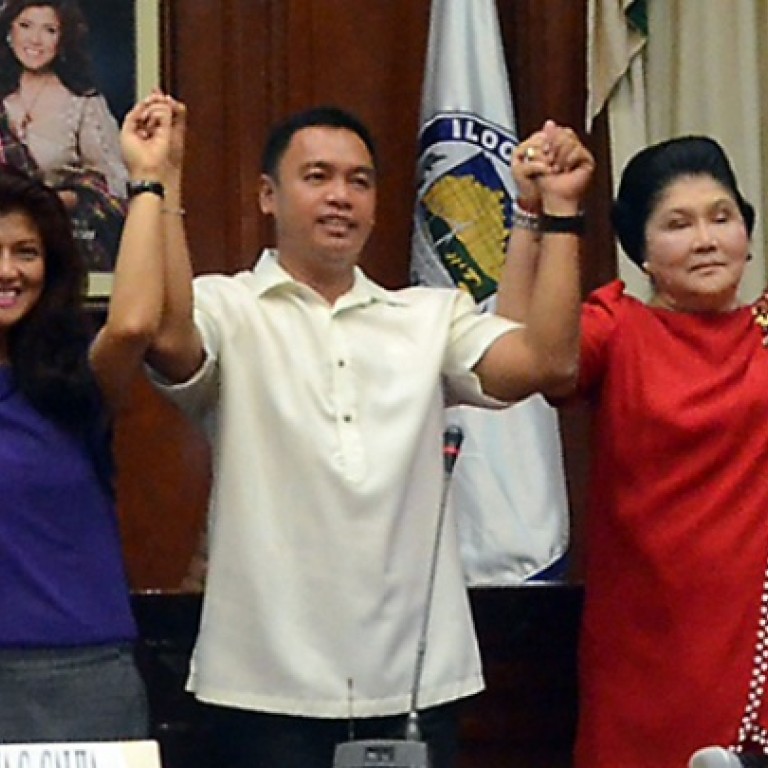
Aquino boosted as Marcos clan wins big in Philippine elections
Philippine President Benigno Aquino on Tuesday secured big wins in mid-term elections seen as vital to his ambitious reform agenda, but the success of famous, graft-tainted rivals raised alarm.
Philippine President Benigno Aquino on Tuesday secured big wins in mid-term elections seen as vital to his ambitious reform agenda, but the success of famous, graft-tainted rivals raised alarm.
Aquino’s ruling Liberal Party and its allies were set to gain control of both houses of Congress, according to the official election tally with more than 75 per cent of Monday’s votes counted.
Most crucial was control of the Senate, with Aquino allies on track to win nine of 12 seats contested in the mid-term elections to give the president a comfortable majority that would allow him to much more easily pass legislation.
“Since we will have a greater support in the Senate, that means we will be able to push our reform agenda, the laws that we feel are our priorities for the country,” presidential spokesman Edwin Lacierda told reporters.
Since we will have a greater support in the Senate, that means we will be able to push our reform agenda, the laws that we feel are our priorities for the country
Aquino won a landslide election victory in 2010 on a platform to fight corruption and improve the standard of governance, problems widely blamed for crushing poverty that most of the nation’s 100 million people endure.
He was widely credited at home and abroad for a successful start to the massive task, and he remains one of the most popular presidents in the country’s history.
In his first three years, Aquino had majority support of the lower house but not the Senate.
He was still able to get through important and controversial pieces of legislation, such as the mainly Catholic country’s first state-backed birth control programme and increased “sin” taxes for tobacco and alcohol.
One of Aquino’s most important upcoming reforms is a planned peace pact with Muslim rebels to end a decades-long insurgency in the south of the country that has claimed an estimated 150,000 lives and severely curbed economic growth.
He will need parliamentary endorsement of the peace deal.
Aquino also wants to pass legislation to expand health care and other social services to the poor, while passing a long-delayed law forcing mining firms to pay higher taxes was also a top priority.
Aquino is restricted by the constitution to one term of six years. The strengthened position for Aquino following Monday’s elections is also expected to help him promote a potential successor to continue with his reforms.
But wins for a host of controversial candidates underlined what critics said were the many problems still facing the Philippines’ young democracy, 27 years after the end of dictator Ferdinand Marcos’s rule.
Marcos’s 83-year-old widow, Imelda, easily won a second straight term in the nation’s lower house representing a northern province, Ilocos Norte, that for decades has been a loyal family stronghold.
Her son is half way through a six-year term in the senate and is eyeing a presidential run in 2016.
Former president and convicted plunderer Joseph Estrada, who was forced from power in 2001 amid a popular uprising, was also elected mayor of Manila, the nation’s capital, giving him oversight of more than 1.6 million people.
“This is a victory of the Filipino masses,” Estrada said after he was proclaimed the winner, insisting his successful political comeback vindicated his long campaign to clear his name.
Estrada, 76, is one of the leaders of the main opposition coalition, the United Nationalist Alliance.
Estrada’s successor, Gloria Arroyo, also easily won a second straight term in the lower house despite campaigning from a military hospital where she has been detained for months while on trial for corruption.
“There is a popular view that we forget (crimes) too easily, we forgive too easily. To some degree that is true,” prominent human rights campaigner Carlos Conde told AFP.
“But ... we are still a very poor country. Our electorate is very malleable. Anybody who has the money and the power to sustain a campaign to sell themselves thoroughly to the electorate will succeed.”
